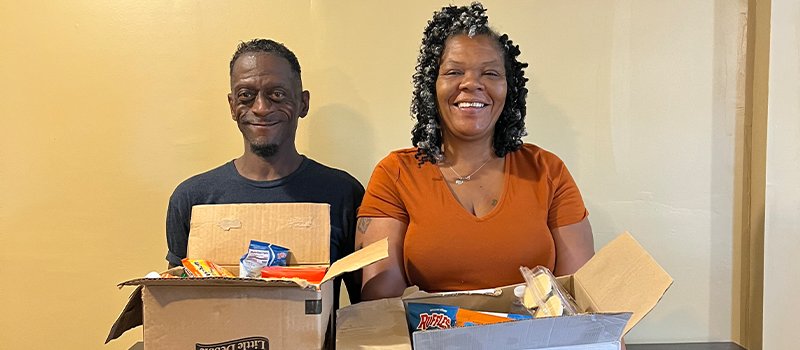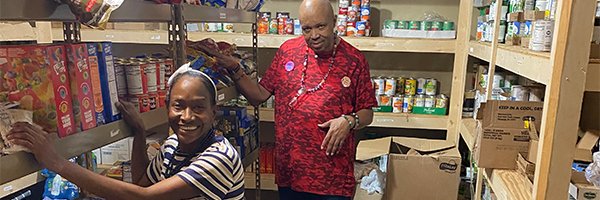Grace House: Nourishing minds, bodies, relationships and souls

Grace House client Willie Gaines and staffer Anita Smith
We all know someone who lives with a medical diagnosis, be it physical or neurological, and wouldn’t dream of turning our backs on them; denying their safety, dignity, advocacy and care for their needs of mind, body and soul. Yet many individuals living with HIV/AIDS find themselves completely shut out of their homes, their rights and their lives.
But there is a place where those living with HIV or AIDS are welcomed with arms full of support and respect — Grace House in Jackson, Mississippi. A few of the people you will find at Grace House include Stacey Howard, executive director, Wes McComas, a licensed master social worker who provides services there, and Mr. Alvin Garvin, a client who accesses the organization’s food pantry. From statistics about the need for its programs and reflections of wellness and relationships nurtured there, they share what’s inside Grace House.
Stacey Howard, Grace House executive director
Grace House, Inc., has operated a home for persons living with HIV and sometimes dying from an AIDS-related illness. Grace House began in 1992, accepting persons with HIV who found themselves displaced by families or landlords. When discovering their family member was ill, some in the household forced them to leave home. Others could not continue paying for housing due to loss of work related to their illness.
Grace House has grown in service to the community since those early years and now assists, on average each year, 600 households having a qualifying family member living with HIV. Grace House still offers shelter services to the displaced but also can provide ongoing rental assistance, clothing, food and comprehensive case management services. The food pantry, assisted partly by the Franciscan Sisters of Perpetual Adoration, offers food boxes to persons referred for nutritional benefits by their medical doctor, case manager or other service providers. Grace House also works closely with an area medical clinic to offer food for immediate consumption that can be distributed to the homeless and hungry when needed at medical appointments. Grace House assists between 50 and 60 households per month with these needed services. In addition to food services, FSPA funding can help provide medications for persons who have yet to qualify for medical assistance and, without the help, would be forced to forgo lifesaving treatment.
Grace House provides housing, nutritional services, clothing, care and compassion to anyone regardless of race, color, sexual orientation, gender, national origin, disability or religion. Unfortunately, the stigma associated with the illness of HIV is still very much alive and well, especially in the southern states, where lack of care and concern continues to allow this illness to rage out of control. According to the Centers for Disease Control and Prevention, the southern portion of the United States continues to be the hardest hit by new cases of HIV. Jackson, Mississippi, is ranked sixth in the country in new cases of HIV and second in cases of AIDS. Grace House will continue to work with other organizations in its service area to end stigma and reduce the spread of HIV.

Grace House clients Lisa Scott and Bernard Harbin
Wes McComas, licensed master social worker
As a social worker for an HIV outpatient clinic, I find Grace House to be a lifesaver for so many people! The food is nutritious and each staff member is par excellence. Many of the people I serve struggle through living in food deserts. Many government assistance programs, like Snap Benefits, are either inadequate or nonexistent. Thanks to the Grace House food bank, our patients can rely on a food box with extra treats when they are in need. Grace House has an open-door policy that allows me to pick up the food box when the patient is unable.
A few months ago I shared with the executive director of Grace House, Stacey Howard, that there have been a lot more people coming into the clinic hungry. Because of our conversation, Grace House is now providing the ready-to-eat snacks which we give to patients who come hungry to their appointments.
I really appreciate the openness and availability of the people of Grace House and the works of mercy the program provides to people living with HIV and their loved ones.
Mr. Alvin Garvin, Grace House client
Grace House has been on point with me receiving a food box each month. I am very appreciative of them. My case manager from adult special care makes sure she sends a referral for me. I then call DOT and tell her its time for my box. It doesn't take long for me to get it one to two days later. The things that are put in the boxes are things that I want to eat. Different choices of meat each month and canned goods really help out. I have told others about the food boxes so that they can be a part of the blessings that I get. Thanks so much, Grace House for doing a GREAT JOB.
Both Stacey and Wes speak with great gratitude for this collaborator in their mission: Franciscan Sister of Perpetual Adoration Dorothy Ann Kundinger who has been a presence in their ministry since early in its inception.
Says Stacey: “Sister Dorothy, began volunteering at Grace House during the early years of its founding, offering love, care and hope to persons stripped of all three. Sister Dorothy continues to be a vital part of the Grace House programs today, helping to ensure care for one of our long-term residents, who has some cognitive damage, by assuring his needs are met. Sister Dorothy has been the most consistent relationship in this man’s life and one of the only people whose name he does not forget.”
Wes shares that “There is one person who I consider a friend and a mentor — Sister Dorothy. She has taught me so much about mercy, love and compassion. My understanding of the commands of Jesus — feed my sheep — is much clearer due to my many years of friendship with her.”
To learn more about Grace House, visit gracehousems.org.
